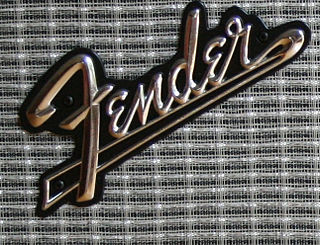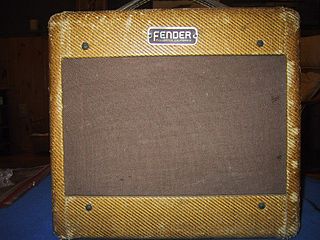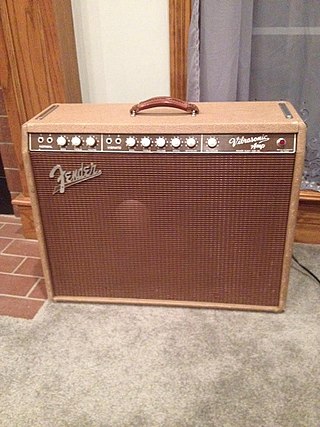
Vox is a British musical equipment manufacturer founded in 1957 by Thomas Walter Jennings in Dartford, Kent, England. The company is most famous for making the Vox AC30 guitar amplifier, used by The Beatles, The Rolling Stones, The Kinks, The Yardbirds, Queen, Dire Straits, U2, and Radiohead; the Vox Continental electric organ, the Vox wah-wah pedal used by Jimi Hendrix, and a series of innovative electric guitars and bass guitars. Since 1992, Vox has been owned by the Japanese electronics firm Korg.

An instrument amplifier is an electronic device that converts the often barely audible or purely electronic signal of a musical instrument into a larger electronic signal to feed to a loudspeaker. An instrument amplifier is used with musical instruments such as an electric guitar, an electric bass, electric organ, electric piano, synthesizers and drum machine to convert the signal from the pickup or other sound source into an electronic signal that has enough power, due to being routed through a power amplifier, capable of driving one or more loudspeaker that can be heard by the performers and audience.

A guitar amplifier is an electronic device or system that strengthens the electrical signal from a pickup on an electric guitar, bass guitar, or acoustic guitar so that it can produce sound through one or more loudspeakers, which are typically housed in a wooden cabinet. A guitar amplifier may be a standalone wood or metal cabinet that contains only the power amplifier circuits, requiring the use of a separate speaker cabinet–or it may be a "combo" amplifier, which contains both the amplifier and one or more speakers in a wooden cabinet. There is a wide range of sizes and power ratings for guitar amplifiers, from small, lightweight "practice amplifiers" with a single 6-inch speaker and a 10-watt amp to heavy combo amps with four 10-inch or four 12-inch speakers and a 100-watt amplifier, which are loud enough to use in a nightclub or bar performance.

The Fender Musical Instruments Corporation is an American manufacturer and marketer of musical instruments and amplifiers. Fender produces acoustic guitars, bass amplifiers and public address equipment; however, it is best known for its solid-body electric guitars and bass guitars, particularly the Stratocaster, Telecaster, Jaguar, Jazzmaster, Precision Bass, and the Jazz Bass. The company was founded in Fullerton, California, by Clarence Leonidas "Leo" Fender in 1946. Andy Mooney has served as the chief executive officer (CEO) since June 2015.

Peavey Electronics Corporation is an American company which designs, develops, manufactures and markets professional audio equipment. It is one of the largest audio equipment manufacturers in the world, and is headquartered in Meridian, Mississippi.
Univox was a musical instrument brand of Unicord from the early 1960s, when they purchased the Amplifier Corporation of America of Westbury, New York, and began to market a line of guitar amplifiers. Univox also distributed guitars by Matsumoku, effects units by Shin-Ei Companion, and synthesizers by Crumar and Korg.
Founded by David Hafler and Ed Laurent in Philadelphia, Pennsylvania in 1955, Dynaco was an American hi-fi audio system manufacturer popular in the 1960s and 1970s for its wide range of affordable, yet high quality audio components.. Its best known product was the ST-70 tube stereo amplifier. They also manufactured other tube and solid state amplifiers, preamplifiers, radio tuners and bookshelf loudspeakers. Dynaco was liquidated in 1980, and the trademark is now owned by Radial Engineering Ltd.

Fender amplifiers are a series of electric instrument amplifiers produced by the Fender Musical Instruments Corporation. The first guitar amplifiers attributed to Leo Fender were manufactured by the K&F Manufacturing Corporation (K&F) between 1945 and 1946. Later, Fender began building its own line of electric guitars. Fender amplifiers would become favorite of many famous guitarists such as Jimi Hendrix, Eric Clapton, and Stevie Ray Vaughan, also known in these cases for playing Fender guitars.
David Hafler was an American audio engineer. He was best known for his work on an improved version of the Williamson amplifier using the ultra-linear circuit of Alan Blumlein.

A bass amplifier is a musical instrument electronic device that uses electrical power to make lower-pitched instruments such as the bass guitar or double bass loud enough to be heard by the performers and audience. Bass amps typically consist of a preamplifier, tone controls, a power amplifier and one or more loudspeakers ("drivers") in a cabinet.

The Fender Twin and Twin Reverb are guitar amplifiers made by Fender Musical Instruments Corporation. The Twin was introduced in 1952, two years before Fender began selling Stratocaster electric guitars. The amps are known for their characteristically clean tone.

The Fender Bassman is a series of bass amplifiers introduced by Fender during 1952. Initially intended to amplify bass guitars, musicians used the 5B6 Bassman to amplify other instruments, including electric guitars, harmonicas, and pedal steel guitars. Besides being a popular and important amplifier in its own right, the Bassman also became the foundation on which Marshall and other companies built their high-gain tube amplifiers.
The Fender Concert was a guitar amplifier made by Fender Musical Instruments. Its production can be split over 2 phases. The first of these running from 1960 and until approximately 1965, at which time a typical Fender Concert was priced at $315. During the 1960s, the Concert was for all practical purposes the same amplifier as the Vibrasonic but with four 10" speakers. In a later phase, the Concert was updated by Paul Rivera in the early 1980s and a subsequent 1x12 variant of the Concert amp appeared briefly in the mid-1990s.

The Fender Champ was a guitar amplifier made by Fender. It was introduced in 1948 and discontinued in 1982. An updated version was introduced in 2006 as part of the "Vintage Modified" line.

The Fender Vibrasonic was an amplifier made by Fender. It was debuted as the first of the new-model Fender amps of the 1960s, with new tolex-covered cabinets and front-mounted control panels that would replace the tweed-covered, top-panel cabinets that were prevalent during the 1950s, as well as new circuitry which would characterize most Fender amplifiers for two decades.

The Fender Princeton was a guitar amplifier made by Fender. It was introduced in 1946 and discontinued in 1979. After Fender introduced the Champ Amp in 1948, the Princeton occupied the next to the bottom spot in the Fender line. Fender Princetons from the early models into the 1970s models are highly valued particularly as recording amplifiers.

The Fender Super was a guitar amplifier made by Fender between 1947 and 1963 and, as the Super Reverb, until 1981. Though it was designed for a clean sound, its overdriven sound is praised by players and critics.

Randall Amplifiers is a manufacturer of solid-state and tube guitar amplifiers. Randall Amplifiers is currently a brand of U.S. Music Corp., a subsidiary of Canadian corporate group Exertis | JAM.
The Fender Showman was a guitar amplifier produced by the Fender company. It was introduced in 1960 and was discontinued in 1993. Blackface and Silverface models such as the Showman, Dual Showman, and Showman Reverb employed the same "piggyback head" design as the Bandmaster and the Bassman. Dual Showman Reverb used the Fender Twin Reverb chassis and came in non-master and master volume versions with "pull boost" circuitry, mid-1970s "tailless" amplifier decal and a slightly larger head. The Fender Showman is often associated with surf guitarist Dick Dale and was notably used in the 1960s by The Byrds, The Bobby Fuller Four, Fleetwood Mac with Peter Green, and in the 1970s by Steve Howe of Yes. Jimi Hendrix owned one early model, and later a Dual. Showmans and Dual Showmans are heavily sought by pedal steel guitar players.
The Fender Pro was an instrument amplifier manufactured by Fender Electric Instruments from 1946 to 1965. It was characterized by its dual 6L6-family power tubes and single 15" speaker, with output power increasing from 18 watts up to 40 watts over its production run. The Pro was replaced in the Fender lineup by its offspring the Pro Reverb.














